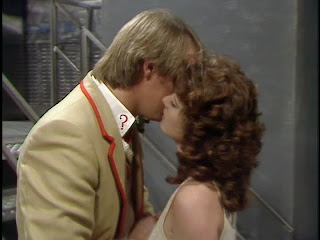Doctor: Tom Baker (4th Doctor)
Companions: Sarah Jane, Harry
Written by: Robert Banks Stewart
Directed by: Douglas Camfield
Background & Significance: Usually when there's a shakeup in Classic
Doctor Who there's a slow period of transition as the show moves into its new ethos. You see it in the Hartnell era when Verity Lambert slowly transitioned into John Wells slowly transitioned into Innes Lloyd with some crossover of stories there. Wells's only real contributions were "
The Massacre" and "
The Ark" ("
Myth-Makers" and "
Daleks' Master Plan" being Lambert commissioned) while "The Celestial Toymaker" and "
The Gunfighters" were more Wellsian than they were Lloydian.
The transition, the weaning, really helps bridge the gap between a giant paradigm shift, and "Terror of the Zygons" is a fantastic bridge between the UNIT era and the Gothic Horror of Hinchcliffe/Holmes.
Written by Robert Banks Stewart in his first of two contributions to
Doctor Who, this story features the last appearance by The Brigadier until "Mawdryn Undead" some eightish years later. Stewart's prior credits (or at least the one most influential on this story) included
The Avengers, leading Stewart to really focus on writing his
Doctor Who like
The Avengers. Script Editor Robert Holmes eventually smoothed out the edges caused by this, but it's clear that this is
Doctor Who unlike we've seen previously. This is really high on the rural adventure that
The Avengers was so known for in the 60s, which is not unwelcome and instead comes across as tremendously exciting and delightfully fresh.
To direct, the production team brought back Douglas Camfield, one of the great
Doctor Who directors, for his first contribution to the program since 1970's "Inferno". Unsurprisingly, Camfield was brought back by the tenacity of the script and tailored his style to fit that.
But really, this is the deep wane of the UNIT years. While UNIT is a present in this, it's more than clear that The Doctor has outgrown them and they have no place in the Hinchcliffe/Holmes era. That doesn't stop them from re-appearing twice more in this season (in "
The Android Invasion" and "
The Seeds of Doom"), but as you'll see in those stories, their opportunity had long since past and they're very, very faded into the background. The Brigadier isn't in "Android Invasion" and Harry and Benton aren't even in "Seeds of Doom". There were plans to kill The Brigadier off in this story (according to legend, it was even Nicholas Courtney's idea), but Hinchcliffe opted to not kill off one of the programme's main supporting players, which led to the quiet exit of UNIT instead of a bombastic blaze of glory.
In their defense, UNIT had had too many opportunities for the bombastic blaze of glory. Probably best to go quietly.
Oh and this story has the Loch Ness Monster. So if you're ever wondering which one that is, it's this one. This is the one in which
Doctor Who does the Loch Ness Monster.
So let's get to it!


















